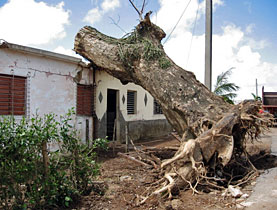
Swiss-run charity promotes football in Cuba

Young Cubans have been enjoying opportunities in sports, education, culture and public health thanks to Camaquito, a Swiss children's charity.
Its local employees, all volunteers, also help shape Camaquito’s various projects, which are bankrolled by private donations and contributions from companies and institutions.
swissinfo.ch caught up with managing director Mark Kuster to talk about the charity.
Kuster is the only person who receives a salary, paid from a separate fund set up by a Swiss association, and not from Camaquito’s budget.
The driving force behind their successful youth football project is a high profile former national goalkeeper, Jörg Stiel.
swissinfo.ch: Socialist Cuba is not a priority for development assistance in Switzerland. What kind of consequences does this have on fundraising?
Mark Kuster: Humanitarian interest in Cuba might not be as widespread as it is for other countries, but feelings for Cuba remain strong. I’m thinking of the approximately 30,000 Swiss citizens who visit Cuba annually.
swissinfo.ch: How does Camaquito’s funding strategy differ from that of other charities?
M.K.: Our slogan is: “Donate with pleasure.” That is, we appeal to those individuals and institutions that associate Cuba with pleasure, comfort and a sensual attitude to life; qualities that are on display, for example, in the film “The Buena Vista Social Club” by Wim Wenders.
swissinfo.ch: You are working in the province of Camagüey on a football project that is also supported by former Swiss international goalkeeper Jörg Stiel. Why football? What does football have to do with emergency or reconstruction aid?
M.K.: Football is a very good means of fostering development in children and adolescents.
swissinfo.ch: It’s well-known in sporting circles that baseball is Cuba’s national sport. Why a football instead of a baseball project for Camaquito?
M.K.: Football is emotionally much more attractive, and it’s an up and coming sport in Cuba. It’s is an intense team sport which is physically demanding and exhausting and is very important for young people in Cuba. Many young Cubans are bored in their spare time. Football provides a good alternative to simply doing nothing.
swissinfo.ch: But there are no football stadiums in Cuba.
M.K.: Precisely. Baseball in Cuba does not need our support, because it‘s already adequately funded by the Cuban government.
swissinfo.ch: Camaquito will bring the Cuban under-15 football team to Switzerland in June. Is this being financed with donations?
M.K.: For the first time ever, the Cuban under-15 team will participate in a tournament of international young talent in Winterthur in June. The costs are being paid by sponsors who specifically support this team, not from Camaquito’s regular budget.
swissinfo.ch: What role does ex-national goalkeeper Jörg Stiel play?
M.K.: Stiel brings credibility, professionalism and competence to the football team. He has already been in Cuba a number of times for the training camp. In May he’ll be here again, training young Cuban goalkeepers.
swissinfo.ch: A lot of projects that Camaquito supports focus on social work in the neighbourhoods. Why is that?
M.K.: The Cuban government takes good care of the academic education of children and adolescents, whereas extracurricular social activities are lacking. What we do is renovate schools, and then ensure that afterwards daily structures are in place. We try to expose young people with problems to local cultural events, and show them how to make meaningful use of their spare time.
swissinfo.ch: Camaquito increasingly supports projects that have little to do with children, such as the Culture & Art Cafe in the city of Camagüey.
M.K.: We have broadened our statutes to reflect this wider range of projects, which also foster a sense of competition among our Cuban partners. To receive funding, they must come to us with solid and sustainable projects.
swissinfo.ch: You have been working with the Cuban authorities for almost ten years. What has your experience there been like?
M.K.: Camaquito has more credibility now, because we have a track record. Our field work is more structured than it was at the beginning. At the same time our work has become more difficult, because it‘s a challenge for the authorities to keep up with the pace of our growing numbers of projects.
swissinfo.ch: What is the most important insight you have gained in your almost ten years of development work in Cuba?
M.K.: I’ve become more relaxed. I’ve had to adapt to the Cuban and Caribbean living and working patterns.
swissinfo.ch: Is Camaquito planning to expand to other cities and regions?
M.K.: We did consider expanding, but in the end decided against it, instead continuing to focus on the city of Camagüey and the surrounding area.
swissinfo.ch: Do you have sufficient funds to expand?
M.K.: At the national level, Camaquito would be a small fish. We prefer to be a big fish in Camagüey.
swissinfo.ch: What is the most difficult experience you have had in Cuba?
M.K.: It‘s not easy to be a charity in Cuba. The workings of a socialist state are different from what we had envisaged. It‘s another way of life here. We‘ve had to make it clear time and again that Camaquito is a politically independent institution.
swissinfo.ch: Isn’t it contradictory that socialist Cuba accepts foreign aid for schools, youth centres and hospitals, all of which are at the heart of revolutionary priorities?
M.K.: I don‘t think that’s a contradiction. Even here in Switzerland, for example, the rich provide aid to poorer mountain areas. There are groups in every single country that are weaker and require economic, social and moral support. What’s certain is that Cuba needs to realise a higher level of economic efficiency than it has until now.
La Yaya water project:
This connected the small community of La Yaya in the province of Camagüey to the drinking water supply. Project total: SFr24,000.
Rebuilding projects after Hurricanes Ike and Paloma:
Camaquito is working on the reconstruction of rural schools in Camagüey. Project Total: SFr 100,000
Renovation kindergarten Ismaelillo, Sibanicú:
The total renovation of the kindergarten will benefit 175 children with mental and physical disabilities, their teachers and their carers. Project Total: SFr73,000.
Complete renovation of the emergency room at the maternity hospital in Camagüey:
The Maternity Hospital Ana Betancourt de Mora in Camagüey has 500 beds and about 980 employees. Each year there are approximately 7,000 births. The 1942-built hospital has been totally renovated. Project total SFr46,000.
Café Literario:
The new, Camaquito-sponsored place to meet for young Cubans offers a café, a gallery for young artists and a room for viewing films. An Internet cafe is planned. The Café Literario holds weekly lectures, concerts, film presentations and debates. Camaquito remains involved in its operation. Project total: SFr16,600.
Camaquito is a charity without political and religious allegiance that supports children and young people in Cuba in the areas of education, culture, sports and public health.
Camaquito is entirely run by volunteers, and pays no wages. An independent association in Switzerland pays the project manager, Mark Kuster, to avoid donations to Camaquito being used to fund personnel costs.
Camaquito does not distribute money in Cuba, but instead supports projects in close cooperation with the Cuban authorities.
(Adapted from German by Kathleen Peters)

In compliance with the JTI standards
More: SWI swissinfo.ch certified by the Journalism Trust Initiative








































You can find an overview of ongoing debates with our journalists here . Please join us!
If you want to start a conversation about a topic raised in this article or want to report factual errors, email us at english@swissinfo.ch.